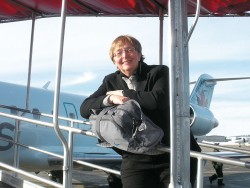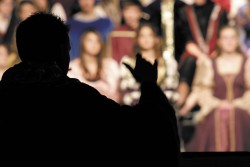 September can be a frustrating time for choral music fans. Eager to reconnect with their favourite choirs, they find that the concert season does not start until October, or even November. What are choirs doing during the first month of the fall, anyhow — bowling tournaments? Poker sessions? Sleeping in?
September can be a frustrating time for choral music fans. Eager to reconnect with their favourite choirs, they find that the concert season does not start until October, or even November. What are choirs doing during the first month of the fall, anyhow — bowling tournaments? Poker sessions? Sleeping in?
Lofty goals: Lydia Adams is the conductor of two accomplished Toronto choirs, the Elmer Iseler Singers and the Amadeus Choir. She writes about the autumn’s first rehearsal, “I personally always have a sense of excitement, butterflies, even, before that first chord. It is pure joy (and relief!) once that first moment is over and you (as a conductor) think: “Okay, we have a sound. Everything is going to be fine.
“I start working for the choir’s sound from that moment. I have a clear idea what I want to hear from the choir and keep asking for that right through to the season’s end.”
Nathaniel Dett Chorale director Brainerd Blyden-Taylor adds, “our organization has a social justice mandate as well as a musical one. We do a one-day retreat early in the fall, to connect with each other spiritually and musically, to find the spirit behind the music.”
But while these comments are insightful, they do not fully address the unique challenges of autumn choral rehearsals. Peeling back the veil of choral silence, this column exposes the complexities and challenges that each choral section presents.
Tenors have the reputation of being self-absorbed, in part because of the inordinate amount of time they spend in front of mirrors. But tenors need mirrors to monitor correct mouth position. This helps in the vocal production of glorious high notes that no other voice can match. No mirrors, no proper mouth position, no high notes — it is astonishing how many people cannot understand or accept this simple equation.
Still, these technical pursuits can interfere with the first few weeks of choral rehearsal. Music directors must struggle to convince tenors to follow their beat, rather than to gaze soulfully into the conductor’s eyes, hoping to see themselves reflected.
Conductors should gently continue to call attention to themselves as rehearsals progress, and eventually the tenors will be able to distinguish them as sentient human beings. But the process must be respectful. The hurtful phrase, “There are other people here besides you, you know!” is to be avoided at all costs.
Basses and altos: The more robust sections of the traditional choir tend to spend summers in physically active pursuits such as white-water rafting, rock-climbing, defusing bombs and rescuing heiresses from eastern European kidnappers bent on world domination.
Often basses and altos have so much fun with these light-hearted outdoor activities that a gentle reminder about fall commitments is not enough to lure them back to the choir. Ensembles with a concert deadline approaching have no choice but to retrieve their low-voiced singers by force. This is done by setting special traps to recapture and bring them back to civilization. Power tools tend to be the standard bait.
 A complex acclimatization process follows, as altos and basses are gradually reintroduced to such things as choir folders, concert dress, hot coffee during break, spoons, napkins and indoor showers. This process is usually very successful; by October or November, altos and basses learn to happily accept standard choir pencils, and stop asking for the picks and axes necessary to mine graphite deposits and chop trees to make their own.
A complex acclimatization process follows, as altos and basses are gradually reintroduced to such things as choir folders, concert dress, hot coffee during break, spoons, napkins and indoor showers. This process is usually very successful; by October or November, altos and basses learn to happily accept standard choir pencils, and stop asking for the picks and axes necessary to mine graphite deposits and chop trees to make their own.
Sopranos, the highest of the four standard choir voices, are subject to a mysterious ailment little known outside choral circles. It is a documented scientific phenomenon that if a soprano goes without a weekly choir rehearsal for a period of time, she will forget that the three lower voices actually exist. In extreme cases, sopranos have been known to forget entire symphony orchestras between the afternoon dress rehearsal and the evening performance.
This presents choirs with an enormous problem as the season gets underway; how to reintroduce the rest of the choir without terminally alarming the sopranos. Often conductors integrate the other sections gradually throughout the autumn, telling the sopranos they are guest audience members who have been granted special dispensation to attend a rehearsal.
Eventually the sopranos notice that these apparent guests are making a noise that resembles singing, and will innocently enquire as to what is taking place. This is the conductor’s opportunity to tell the sopranos wonderful stories about helpful, magical beings named “Tenor,” “Alto” and “Bass,” who only live to help and serve sopranos as they do their important work. Sopranos always respond with gratitude and interest to these exotic but unobtrusive creatures, and their fascination often lasts for several rehearsals.
Leaving choirs to their autumn challenges, let us investigate which concerts are taking place this month.
Lydia Adams, mentioned above, recently won the prestigious Roy Thomson Hall Award of Recognition. Adams writes, “I was amazed and humbled. I also was overwhelmed as I was acutely aware of having worked with many of the other musicians who had won the Award: Lois Marshall, Maureen Forrester, Robert Aitken and, of course, Elmer Iseler were all musicians who held special meaning for me and who influenced my career in a major way. I am happy for the recognition for my choirs and also for the choral community in Toronto.”
Look forward later in the fall to Adams’ Elmer Iseler Singers presenting a concert, October 21, celebrating the diamond jubilee of Queen Elizabeth II, featuring works by many great composers from Handel and Purcell, to the Modernists Tippet and Britten who rescued British music in the 20th century. And on October 27 the Amadeus Choir will present Rachmaninoff’s beautiful and imposing Vespers. Blyden-Taylor’s ensemble performs three distinct and interesting programs at Toronto’s Nuit Blanche between September 29 and 30, including works by Canadian composers Sid Rabinovitch and Peter Togni. They are also performing a benefit concert in Orangeville on September 22 for the One-world Schoolhouse, to raise money for schools in St. Lucia. See their website for details.
Finally, England’s renowned Tallis Scholars visit the city on September 12, bringing their signature sound to a program of renaissance and early baroque music.
Ben Stein is a Toronto tenor and theorbist. He can be contacted at choralscene@thewholenote.com. Visit his website at benjaminstein.ca.



